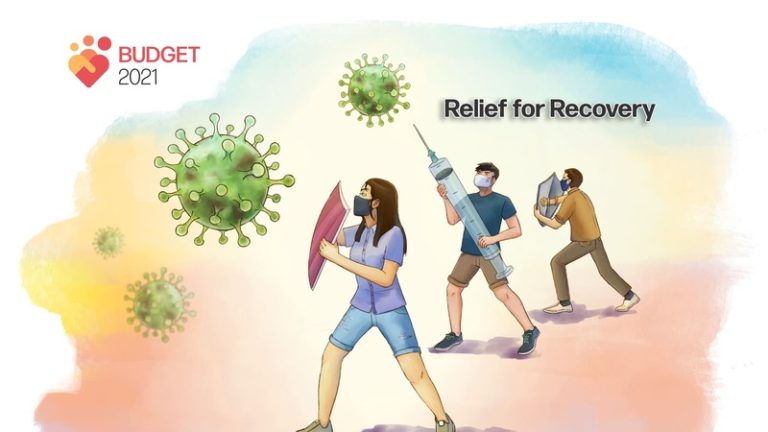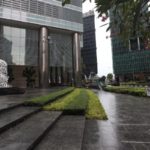Top 5 Key Highlights of Current Singapore Budget 2021

In the midst of an unprecedented crisis, the natural instinct is to double down on the now. When survival and livelihoods are at stake, responding to immediate threats takes on significant importance. Beyond providing temporary reliefs to weather through the storm, it is also critical to keep an eye on the beyond, for the simple reason that large crises reshape the long-term competitive landscape. A post-crisis world may look very different, with different norms, rules, competitors and value propositions.
Against this backdrop, Singapore budget 2021, which was unveiled by Deputy Prime Minister and Finance Minister Heng Swee Keat on 16 February 2021 seeks to help workers and businesses adapt, innovate, grow and emerge from the COVID-19 pandemic stronger as an economy, and together as one people.
Singapore budget 2021 is expansionary, with an expected deficit of S$11b (or 2.2% of Singapore’s gross domestic product), which is necessary to overcome the extraordinary challenges that the COVID-19 pandemic continues to pose.
1. $11 billion for COVID-19 Resilience Package
There will be a three-pronged approach for the COVID-19 Resilience Package:
Safeguard the health of Singaporeans
Vaccinating our people is key. Hence, $4.8 billion of the COVID-19 resilience package will be set aside for public health and safe reopening measures, covering costs for vaccination and contact tracing, testing and isolation facilities.
Support workers and businesses where needed
Some sectors grow well, but others remain stressed. The Job Support Scheme (JSS) will continue to be provided for up to the next six months, for sectors that continue to be hard hit, such as those in Tier 1 — aviation, aerospace and tourism. The JSS extension will cost $700 million.
More targeted support for the worst hit sectors
Sectors such as aviation will need help to maintain capabilities and eventually recover. The following sectors will receive:
$870 million as targeted support and cost relief for the aviation sector.
$133 million dollars have been set aside for the COVID-19 Driver Relief Fund, to aid taxi and private hire car drivers ($600/month from January to March 2021, $450/month from April to June 2021).
$45 million dollars for extension and enhancement to the Arts and Culture Resilience Package and Sports Resilience Package, supporting businesses and self-employed persons in the arts, entertainment and sports sectors.
2. Enhancement to wages and job opportunities
The salaries of nurses and healthcare workers such as support care staff will be enhanced. More details will be announced by Health Minister Gan Kim Yong.
To enhance the local-foreign workforce complementarity and industry transformation, there are three main changes:
- Extend Wage Credit Scheme: To support the employment of Singaporeans by retaining and drawing in locals, the Wage Credit Scheme will be extended for a year, at a co-funding level of 15%.
- Extend Capability Transfer Programme (CTP): The CTP that supports foreign worker skills transfer will be extended up to end-September 2024.
- Reduce Manufacturing S Pass sub-Dependency Ratio Ceiling (DRC): The Government will reduce the sub-DRC for manufacturing in two steps, to 18% from 1 Jan 2022, and to 15% from 1 Jan 2023.
3. More help for families, including $100 vouchers
A S$900 million Household Support Package will be rolled out for families amid the ongoing economic uncertainty. The package includes vouchers that each household can use to defray expenses and support local businesses, as well as service and conservancy charge (S&CC) rebates and goods and services tax (GST) vouchers.
About 1.3 million households will receive $100 Community Development Council (CDC) vouchers that can be used at participating heartland shops and hawker centres. Eligible Singaporean households in Housing Board flats will also receive rebates to offset between 1½ and 3½ months of S&CC over the year.
About 1.4 million lower-income Singaporeans will get an additional GST Voucher – Cash Special Payment of $200 in June, on top of the regular GST Voucher cash payout. About 950,000 households will also get additional utilities rebates of between $120 and $200 under the GST Voucher — U-Save Special Payment that will be credited in April and July.
This means they will receive 1½ times their usual annual rebate. Singaporean children below the age of 21 will get a $200 top-up to their Child Development Account, Edusave account, or Post-Secondary Education Account. This will benefit about 780,000 children.
4. Cheaper electric vehicles, more charging points
Singapore budget 2021 will more than double its targeted number of charging points for electric vehicles in the next decade.
It will deploy 60,000 charging points at public carparks and private premises by 2030, up from the previous target of 28,000.
Heng on Tuesday said $30 million will be set aside over the next five years for initiatives related to electric vehicles, like measures to increase the number of chargers at private properties.
To further encourage the early adoption of electric cars, there will also be a lower cost difference between electric cars and internal combustion engine (ICE) cars.
The minimum Additional Registration Fee (ARF) for electric cars will be lowered to zero from January 2022 to December 2023.
Currently, all car buyers have to pay at least $5,000 in ARF, regardless of the tax rebate a car is entitled to.
5. GST rate increase will not happen in 2021
Impending GST rate increase
To finance the recurrent spending needs, the Goods and Services Tax (GST) rate increase from 7% to 9% will not be raised in Singapore budget 2021. The move to increase our GST rate will be made between 2022 to 2025. This will help to meet our rising recurring needs such as healthcare.
To help Singaporeans ease into the impending GST rate increase, the Government has set aside $6 billion for an Assurance Package. The package will delay the effect of the GST rate increase for Singaporean households by at least five years, with even more support provided for lower income households.
GST on imported low-value goods
Currently, low-value goods imported via air or post are not subject to GST. However, Singapore will extend GST to imported low-value goods with effect from 1 January 2023. This will help to ensure a level playing field for local businesses and overseas suppliers.
Government will issue new bonds to finance major, long-term infrastructure
The Government intends to issue new bonds under a Significant Infrastructure Government Loan Act (SINGA) to help finance major long-term infrastructure, such as MRT lines and tidal walls. This also allows us to maximise the current low-interest rate environment.
There will be a limit of $90 billion for borrowing under SINGA, based on the expected project pipeline.





